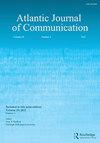Beyond the abyss: a proposal for navigating polarized positions
IF 1
Q3 COMMUNICATION
引用次数: 1
Abstract
ABSTRACT In response to relentless levels of political polarization in the United States, this essay asks to what extent a shift in pedagogical practices might aid in ameliorating it, especially through the inculcation of rhetorical skills which lend themselves toward the cultivation of a robust form of civic dialogue. To do so, the relationship between rhetoric, (intergroup) dialogue, and debate is assessed and considered with respect to deliberation in the public sphere to provide context for the theoretical maxims and praxis of civic discourse. Then, using the preceding analyses, an evaluative framework is offered to assess the efficacy of dialogic rhetoric in a contemporary setting. Using this framework implementation of the Dialogue and Argumentation for Cultural Literacy Learning in Schools (DIALLS) program being pioneered throughout the European Union into American pedagogy is considered as a means to mitigate future polarizing discourse through the promotion of a nuanced, collaborative approach to meaning making and knowledge construction. Following this examination, a brief assessment of the rhetoric of Democratic Senator Sherrod Brown from Ohio is offered to illustrate the practical applicability of inclusive, dialogic rhetoric in an age of polarization and division.在深渊之外:一份指引两极分化立场的建议
为了应对美国持续不断的政治两极分化,本文提出了在多大程度上改变教学实践可能有助于改善这种情况的问题,特别是通过灌输修辞技巧来培养一种强有力的公民对话形式。为了做到这一点,修辞、(群体间)对话和辩论之间的关系被评估和考虑到公共领域的审议,为公民话语的理论格言和实践提供了背景。然后,利用前面的分析,提供了一个评估框架来评估对话修辞在当代环境中的有效性。利用这一框架,在欧盟范围内开创的“学校文化素养学习对话与论证”(DIALLS)项目在美国的教学中得以实施,被认为是一种通过促进微妙的、合作的方法来产生意义和构建知识,从而减轻未来两极分化话语的手段。在此基础上,本文对来自俄亥俄州的民主党参议员谢罗德·布朗的修辞学进行了简要评价,以说明包容性、对话性修辞学在两极分化和分裂时代的实际适用性。
本文章由计算机程序翻译,如有差异,请以英文原文为准。
求助全文
约1分钟内获得全文
求助全文

 求助内容:
求助内容: 应助结果提醒方式:
应助结果提醒方式:


